Sometimes, I struggle with how to handle perplexing parenting challenges in a way that can leave me feeling forlorn. I seem to make countless missteps, including this morning’s power struggle with my preschooler about whether he could wear shorts in winter.
At the same time, I embrace that I’m always learning and I turn to reading research and books about child development and parenting science. As one dad recently told me, books won’t judge your parenting like some of the people you might consult for advice. The best parenting books can be a lifeline, offering encouragement that “you’ve got this!” and distilling parenting insights while assuming that you have your own rich wisdom to build upon.
Our favorite parenting and family books of 2018 offer guidance to cultivate kindness and compassion, independence and self-confidence, and organizational skills in children. They also offer tips on how to handle toddler tantrums and how to navigate modern grandparenthood. All of our picks, regardless of topic, are practical and hopeful.
The Kindness Advantage: Cultivating Compassionate and Connected Children, by Dale Atkins and Amanda Salzhauer
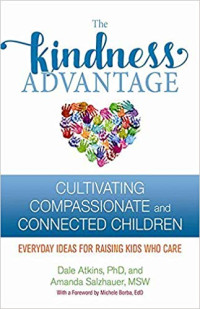 HCI, 2018, 168 pages. Read an essay adapted from The Kindness Advantage.
HCI, 2018, 168 pages. Read an essay adapted from The Kindness Advantage.
Although parents want to hear their children regularly say “please” and “thank you,” cultivating kindness and compassion goes well beyond teaching good manners. Mental health professionals and aunt-niece team Dale Atkins and Amanda Salzhauer argue that all of us, including our children, are hardwired to show kindness. In their book, The Kindness Advantage, they offer parents a practical guide to help their children manifest their capacity to become “kindness superheroes.”
Their book offers ten building blocks of kindness, including acceptance, commitment, connection, empathy, giving, nurturing, observing, and questioning. Each kindness fundamental includes text to read with your child, questions to discuss to link to your child’s own experiences, everyday activities to practice, and inspiring true stories and quotes.
For example, for the kindness fundamental of acceptance, they ask kids to reflect on whether they’ve met anyone they think is too different to be their friend and why. Atkins and Salzhauer also advise you to model acceptance, introducing your child to colleagues and friends you’ve made from different religions, races, and backgrounds.
The tips in this book will inspire parents to model and practice small and daily acts of kindness with their children that become habits to perpetuate goodness in the world.
The Organized Child: An Effective Program to Maximize Your Kid’s Potential—in School and in Life, by Richard Gallagher, Elana Spira, and Jennifer Rosenblatt
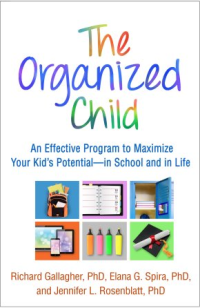 The Guilford Press, 2018, 206 pages. Read an essay adapted from The Organized Child.
The Guilford Press, 2018, 206 pages. Read an essay adapted from The Organized Child.
While parents might want their children to get organized, it often feels like an uphill battle. Pushing them to get ready for school on time or complete their homework can lead to epic meltdowns in kids and frazzled nerves in parents. In The Organized Child, psychologists Richard Gallagher, Elana Spira, and Jennifer Rosenblatt provide parents with research-based guidance that improves kids’ organization, time management, and planning skills, while helping keep parents sane.
In contrast to the frequent go-to parent strategy of nagging, the authors recommend positive prompting, which entails making pleasant requests to children using authentic encouragement and praising their efforts. To make positive prompts effective, they suggest you move close to your child rather than yelling from across the house, get your child’s attention by making eye contact, ask for one thing at a time to help them focus on what’s important, and keep the emphasis on the present rather than bringing up past failures.
Written primarily for parents of seven- to 13-year olds, the book aims to help parents help their kids become efficient and self-sufficient by taking one step at a time, emphasizing repeated practice, and removing blame.
Unconditional Love: A Guide to Navigating the Joys and Challenges of Being a Grandparent Today, by Jane Isay
 Harper, 2018, 240 pages. Read our review of Unconditional Love.
Harper, 2018, 240 pages. Read our review of Unconditional Love.
For grandparents, navigating relationships with their grandchildren and their own adult children can be both deeply fulfilling and tricky at times. In Unconditional Love, Jane Isay interviewed members of all three generations to learn more about the challenges they face and how they overcome them. She shares how “grandparents can, with [their] perspective and experience, find a way to keep the love flowing.”
Isay provides tips to enhance connection and communication between grandparents and grandchildren—including how to enter a child’s world, how to stay in relationships as grandchildren grow, how to create the rituals that foster consistency and fun, and when to let go. She makes suggestions to improve the grandparent-parent relationship by encouraging an attitude of respect, communication, forgiveness, and self-restraint.
Ultimately, she argues that grandparents can be vibrant and vital members of a family system. Isay writes, “Unconditional love is the magic bridge that spans the generations: We love them unconditionally, and they love us back without reservations. It’s a two-way experience. It grows the children and gentles the grandparents.”
Raising Independent, Self-Confident Kids: Nine Essential Skills to Teach Your Child or Teen, by Wendy Moss and Donald Moses
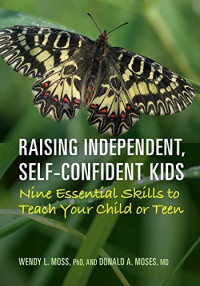 APA LifeTools, 2017, 242 pages. Read an essay adapted from Raising Independent, Self-Confident Kids.
APA LifeTools, 2017, 242 pages. Read an essay adapted from Raising Independent, Self-Confident Kids.
When children become frustrated or disappointed, our auto-pilot response as parents is often to step in immediately and make everything better. But some of those frustrations or disappointments can be opportunities for children to build resilience—that is, if parents can make space for their children to learn coping skills.
In their book Raising Independent, Self-Confident Kids, psychologist Wendy Moss and psychiatrist Donald Moses offer resilience-building strategies for parents. They suggest you try your best to stay calm, particularly since children can become more upset when they see that you are losing it. And they advise you to be consistent even during conflicts, because—while children may disagree with you—they derive a sense of security and comfort from your predictability.
Moss and Moses also recommend saying yes if you don’t have a good reason to say no, which brings joy to children and strengthens your relationship. But when you’re unsure about granting requests, they advise delaying the decision to a time when children are calmer and you can talk without distractions. Practicing good communication skills—like active listening, restating children’s requests and reasoning, explaining your own reasoning to children, and using “I” statements to talk about how you feel—will help children learn resilience, too.
Moss and Moses encourage parents to foster their children’s self-reliance, a skill that will serve kids as they get older and more independent in life.
The Tantrum Survival Guide: Tune In to Your Toddler’s Mind (and Your Own) to Calm the Craziness and Make Family Fun Again, by Rebecca Schrag Hershberg
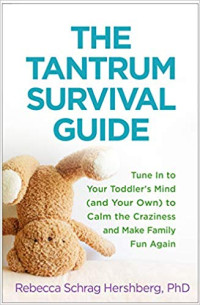 The Guilford Press, 2018, 250 pages.
The Guilford Press, 2018, 250 pages.
Toddler and preschooler tantrums can leave parents feeling helpless and emotionally depleted. In The Tantrum Survival Guide, psychologist Rebecca Schrag Hershberg outlines mindfulness techniques to help parents keep their cool and keep the faith that the tantrum will pass eventually…and possibly quickly.
In the midst of a tantrum, she reminds you to take three seconds to check in with yourself and gain awareness about how you can stay grounded—perhaps by taking a few breaths or focusing on your feet. When turning attention to your child, she suggests being present and listening without trying to intervene and using touch when appropriate to show affection. Practicing loving-kindness towards yourself can also help you cope with the difficulty of handling tantrums.
Hershberg recommends that parents radically accept toddlerhood and adjust their expectations for their children’s brain development, too, pointing out that tantrums are developmentally expected when children are between 18 months and four to five years old. These tips won’t make tantrums disappear altogether, and that’s OK; meltdowns provide an opportunity for you to reflect and grow.
“Certainly there are ways to reduce the frequency and severity of tantrums when they are destroying the family peace, and doing so is valuable for everyone, your toddler included. But ‘controlling’ tantrums, aside from being impossible, is not something to strive for,” writes Hershberg.
With humor, encouragement, and science, she guides parents to handle tantrums so that their children can learn to manage and cope with overwhelming feelings as they get older.





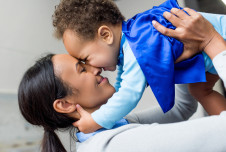

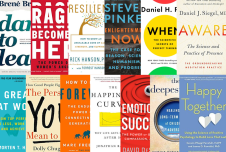
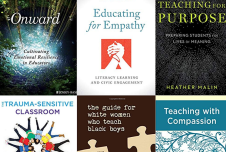
Comments